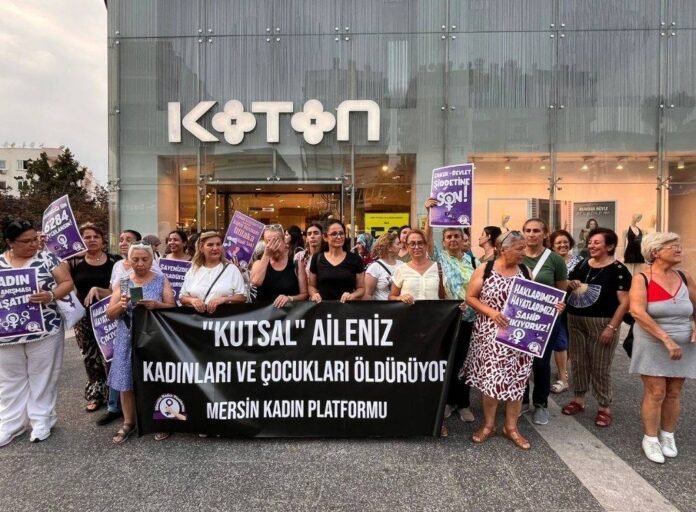A women’s rights group in the southern Turkish province of Mersin held a street protest on Tuesday, condemning the murder of three women in a single day by their male relatives, the Bianet news website reported.
Belkıs Durmuş, Aygül Çınar and Türkan Söylemez were murdered by close male relatives in Mersin last Thursday. The Mersin Women’s Platform held a protest to condemn the murders and government policies that fail to protect women vulnerable to gender-based violence.
Ceren İnan, a member of the platform, said, “We are not in mourning, we are in revolt. We are here to demand justice for the women who were murdered. In this country, we wake up each day to news of death, injustice, repression and femicide.”
İnan drew attention to the fact that many women were killed in their own homes. “For years, women have been condemned to homes where they face violence. The male-dominated government’s rhetoric of the ‘sacred family’ has exacerbated this problem. In this so-called Year of the Family, hundreds of women continue to be murdered in their own homes. The government calls femicides ‘isolated incidents,’ turns a blind eye and fails to punish the perpetrators and is directly complicit in these massacres along with the perpetrators themselves.”
The Turkish government has declared 2025 the Year of the Family, with the Ministry of Family and Social Services organizing events to promote traditional family values and child welfare.
However, women rights activists have said the program reinforces traditional domestic roles rather than addressing challenges women face at home and in the workplace.
According to the Mersin Women’s Platform, government policies have normalized violence against women and pressured them into silence by promoting the belief that “what happens in the family stays in the family.” As a result, many homes have turned into crime scenes, with women unable to access the support and protection they need.
The platform members added that complaints made by women to authorities were often ignored, and that perpetrators of violence felt empowered by the indifference to women’s complaints.
“Just last week, university student Ayşe Tokyaz was murdered after enduring systematic violence from former police officer Cemil Koç. Her sister’s reports to the authorities were ignored,” said Inan.
Twenty-one-year-old Ayşe Tokyaz was found dead on July 13, her body stuffed in a suitcase abandoned by the roadside. Her sister, Esra Tokyaz, says Ayşe had been subjected to domestic violence by her boyfriend, former police chief Cemil Koç. Despite reporting the abuse to police, nothing was done to protect the young woman.
Femicides and violence against women are serious problems in Turkey, where women are killed, raped or beaten every day. Many critics say the main reason behind the situation is the policies of the Justice and Development Party (AKP) government, which protects violent and abusive men by granting them impunity.
Despite opposition from the international community and women’s rights groups, Turkish President Recep Tayyip Erdoğan issued a decree in March 2021 that pulled the country out of an international treaty that requires governments to adopt legislation prosecuting perpetrators of domestic violence and similar abuse as well as marital rape and female genital mutilation.
The Council of Europe Convention on Preventing and Combating Violence against Women and Domestic Violence, better known as the Istanbul Convention, is an international accord designed to protect women’s rights and prevent domestic violence in societies and was opened to the signature of member countries of the Council of Europe in 2011.
Women’s rights advocates have repeatedly called on authorities to take effective measures against femicide, especially effectively implementing Law No. 6284, which aims to protect women against violence.














